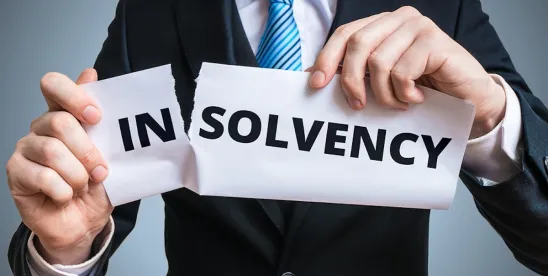Most high-growth companies find themselves in a race against the clock, trying to use whatever capital they may have to achieve milestones prior to hitting their cash-out date. When markets are tight, as they have been over the past several months, founders and boards confront the reality of a liquidity crisis on a nearly daily basis in their scenario planning. It can come in the form of a potential buyer or investor deciding to walk away from a deal, a current investor experiencing its own liquidity crunch, or unfavorable data coming at an unfavorable time. Whatever the cause, when a company approaches insolvency, it is often an existential event, forcing the board of directors to think carefully about how to help the company make decisions in view of the board’s changing fiduciary duties, as well as how those duties may be impacted by a company’s declining cash position.
In this article we provide practical guidance for directors of Delaware corporations in these moments of distress, including an overview of how fiduciary duties change as a company approaches or enters insolvency. Our advice is targeted to early- and growth-stage companies, but the principles here will apply to all Delaware corporations, regardless of size.
What are Fiduciary Duties?
All directors have fiduciary duties that require that they act in good faith and in the best interests of the company. These duties are often summed up as the “duty of care” and the “duty of loyalty”, and generally speaking will require that the director (i) exercise a certain level of care and judgment when making decisions that impact the company, e.g. remaining informed on all material information reasonably available and, when making a decision, considering that information, as well as any reasonable alternatives, and (ii) act in good faith for the benefit of the company, e.g. not engaging in self-dealing, usurping corporate opportunities, or ignoring confidentiality obligations.
How does a Company’s Financial Distress Impact a Director’s Fiduciary Duties?
Regardless of whether a company is experiencing financial distress, directors must always make decisions in view of their fiduciary duties – however, the state of a company’s solvency can expand the group of stakeholders to whom directors owe fiduciary duties. When a company is solvent, directors’ fiduciary duties are owed to the company and its owners. However, when a company becomes insolvent, directors owe fiduciary duties not only to the company and its owners, but to the company’s creditors as well. In other words, when a company is insolvent, directors can no longer focus only on creating a return for equity, but must consider all stakeholders, including creditors, when making decisions.
It is important to understand that under Delaware law, this change is actually achieved through a somewhat technical means: when a company is insolvent, creditors will generally have derivative standing to assert claims against directors for breach of fiduciary duty. Importantly, this does not mean that directors have any specialized duties owed to creditors, or that directors are required to liquidate an insolvent company for the benefit of creditors (the board may decide, using good business judgement, that continued operations may be the best way to maximize return to creditors).
When is a Company Insolvent?
There is no single, definitive test for determining insolvency, but courts will typically view a company as insolvent at either the point at which (i) the company’s liabilities exceed the value of its assets (the “balance sheet test”), or (ii) the company is unable to satisfy its debts as they become due (the “equitable insolvency test”).
It can be difficult for early- and growth-stage companies to identify whether they are technically insolvent under either the balance sheet test or the equitable insolvency test and when this first occurs. As directors know, such companies can be susceptible to any number of disruptions at any given time that can impact their ability to pay vendors and satisfy debt obligations. Therefore, financial projections must be updated regularly, and forecasting must be handled with conservative assumptions, to ensure that the company does not overestimate its cash runway.
A conservative approach is important because whether a company is insolvent is usually determined with the benefit of hindsight, after too much cash has been spent, decisions have been made, and aggrieved creditors or equity holders are threatening or filing lawsuits. Early warning systems are essential. Although a company’s entry into the so-called “zone of insolvency” will not cause a shift in a directors’ fiduciary duties, directors of financially distressed companies can expect that all decisions in the lead-up to an insolvency will be scrutinized and second-guessed. Therefore, we urge management and directors alike to take a planful and conservative view of cash burn (and consider the interests of the company’s creditors in the context of decisions made as the company approaches insolvency), rather than waiting for a company to meet a technical insolvency test.
What Should Directors Do When a Company Becomes Insolvent or Approaches Insolvency?
Knowing that directors of distressed companies – insolvent or otherwise – can expect extra scrutiny on the actions or inactions of the board, directors should be sure to take steps to protect themselves, and protect the company, during any period of insolvency or financial distress. Here are a few examples of prudent practices that directors can adopt:
- Get good advice. Fiduciary issues, insolvency, and contingency planning are complicated, and involve an inextricable mix of legal and business concepts. The company should retain professionals to advise the directors on these issues and to assist the board in navigating, documenting, and defending these decisions.
- Stay informed and explore all options. Obtain and consider all material information relating to each business decision, and consider and thoroughly review all reasonable options available to the company. Even if a company is on the brink of closing, it may be possible for directors to approve a “Hail Mary” strategy provided that the decision is well informed and properly weighs the potential benefit against the risks of potential of failure. This is especially important because there may be times when the interests of owners differ from the interests of creditors – with creditors questioning the efficacy of a “Hail Mary” that may result in greater loss if unsuccessful. The “business judgement rule” (the subject of another article entirely) still applies to all director decision-making, whether a company is insolvent or not.
- Beware of commitments that may impact cash position. Understand how a strategy will impact the company’s financial position. Even if the company is solvent at the time a decision is made, transactions or other commitments that leave the company with inadequate capital may be viewed as an attempt to hinder, delay or defraud creditors or as not being for reasonably equivalent value. Such transactions can be challenged, and directors sued.
- Maintain records. Document the board’s actions and deliberations with detailed written reports that identify the materials reviewed and considered in connection with a business decision. Minutes should also be prepared for each board meeting. Record-keeping is essential evidence to show that directors’ decisions were well-informed and carefully considered, which is important if the decisions are later challenged.
- Avoid conflicts of interests. Avoid any transaction that has an appearance of self-dealing. However, sometimes an insider transaction is the best available option, in which case the company’s attorneys will help the company properly disclose to the board (and potentially to the stockholders, if a cleansing stockholder vote is desired) the potential conflicts of interest, handle director voting and/or abstentions as needed, and take other steps to best insulate the transaction from challenge.
- Budget for a winddown. If there is a possibility the company may wind down operations, through a bankruptcy process, an assignment-for-the-benefit of creditors, or a dissolution under Delaware law, build the costs for such a winddown into the company’s budget – and, based on that budget, identify a date by which the decision must be made.
- Avoid Potential Personal Liability. Understand whether you can be personally liable for any debts or obligations of the company. For example, in many states, directors are personally liable for unpaid wages if they allow employees to continue to work while knowing that there is insufficient cash to pay employees’ wages.
- Purchase Tail Insurance. Directors’ and Officers’ insurance will cover most lawsuits against directors and management alleging breach of fiduciary duties, but in a wind-down or other insolvency scenario, it is sensible to consider (and budget for) purchasing a longer tail on that insurance, to ensure adequate coverage for challenges that may arise to the actions or inactions of the board during this period.





 />i
/>i

